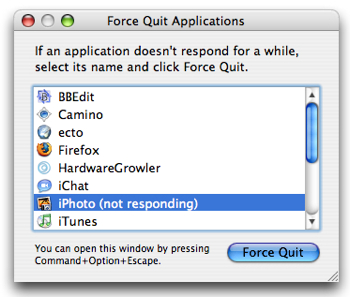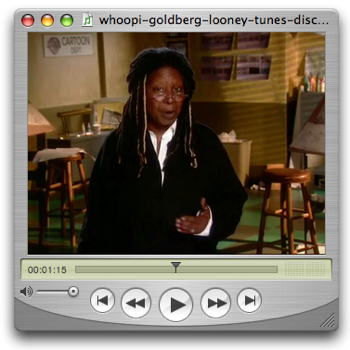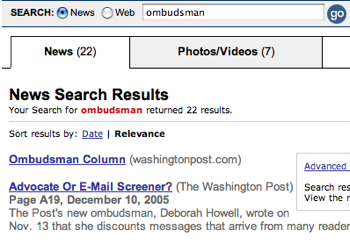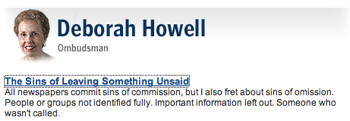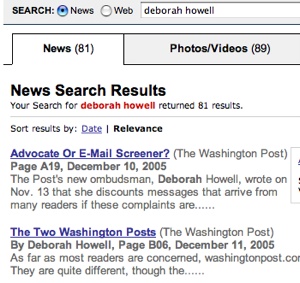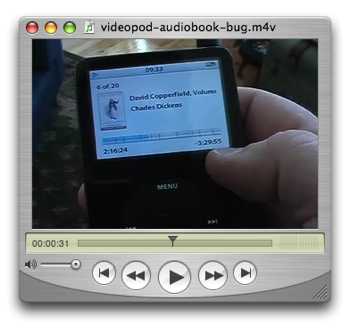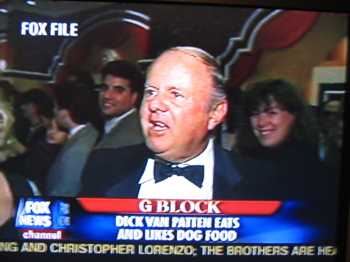
|
|||
|
Thursday 29 December 2005
Technology
iPhoto Sucks I am so sick of this. I’ve explored all the reasonable alternatives, and found none of them to be reasonable:
I don’t think I’ve actually been able to quit iPhoto normally for a few months now. It manages to lock up before I’m done with it 100% of the time now. Posted by tino at 21:13 29.12.05
Tuesday 27 December 2005
General Idiocy
Dangers Of Meth Labs
So this is unbelievably, incredibly dangerous work being done by people who are in a distorted euphoria for days on end, say the police. But they are surprised that more of these people don’t blow themselves up. Could it just possibly be that the cops are either overestimating the danger, or underestimating the knowledge and skill of the meth producers? Do you think? Naah. The police would never, ever exaggerate things just to whip up hysteria.
And why is this? Could it possibly be because investing in proper equipment is pointless when the police can step in and seize all of it? Could it possibly be because, while meth production appears to be pretty lucrative, people with the best training will choose to do something else, rather than run the risk of an encounter with the cops? The froth over the supposed dangers of meth labs — in 2004, 27 people (including three children) died in meth lab accidents, according to the DEA, which means that running a meth lab actually looks quite safe — rings a big hollow since most or all of these dangers would disappear overnight if it weren’t for the War On Some Drugs. Making whiskey also involves volatile evaporates, but I can’t remember the last time I heard about someone being killed in a distillery explosion, or about someone setting up a clandestine ‘whiskey lab’ in a motel. So which is it? The culture at large seems to have decided that the cost of people getting high is so great that it merits laws that encourage clandestine, dangerous production of meth (which is apparently a fairly nasty drug and which is only in demand anyway because of other market-distorting actions of the DEA et al.) So stop complaining about the unintended but entirely forseeable effects of your own bad policies. Posted by tino at 16:15 27.12.05
Monday 26 December 2005
Cultural Note
Protecting Us From Ourselves, Part 943 I have read a number of things about the Whoopi Goldberg disclaimer — called an ‘introduction’ for some reason — on the new Looney Tunes DVD collection. I only saw the introduction — ‘disclaimer’ would be a better term — yesterday, because Santa left a copy of the collection for Nicole. For two and a half minutes, Ms. Goldberg tells us that these cartoons are great. However.
Ms. Goldberg goes on to pat Warner Brothers on the back for how progressive its polices really were back then, woof woof woof. You can see the video (in iPod video format, which should be playable by any computer with Quicktime 7 or the most recent version of iTunes) here. I have mixed feelings about this disclaimer. If this is what’s needed for companies to be able to release cultural products from the past which are now regarded as entartete Kunst, so be it. Big companies like Time Warner live in stark terror of being accused of even seeming to be discriminatory in any way, probably because it’s almost totally impossible to defend oneself or one’s company against such charges. Time Warner is attempting to do so preemptively, by hiring famous black person Whoopi Goldberg as their aplologist. If they couldn’t do this, they wouldn’t release the cartoons at all. If this works, it might be possible one day to again see Disney’s Song of the South. But at the same time I’m personally offended by this disclaimer, because it seems to carry with it the implication that I, Tino, need this warning: that without it, I might think that it is suddenly okay to make fun of ethnic groups. Because certainly there’s nothing else in the culture that would indicate otherwise. Cough. I must say that the only ethnic group I’ve seen made fun of on the discs so far is hillbillies. I’m sure, though, that there’s ten seconds somewhere on these four DVDs of a porter or bellman drawn to look like a monkey saying ‘Yazzuh, Mistuh Fudd, I’se sho nuff seen dat rabbit what yo lookin’ fo!’ or some such: and for that I have to listen to Whoopi Goldberg for two minutes and thirty seconds every time I put one of the discs in. And I think that this has helped me locate the origin of most of the discontentment I feel and write about here: In too many of my daily interactions, I am given no credit for not being a child/moron/criminal/racist/jackass/scam artist/drunk/junkie/etc. — I’m assumed to be all of these things until I prove otherwise, and then that proof is only accepted grudgingly, and with suspicion. And I’m tired of it. It’s not just me, of course, but the fact that you are also not given credit for not being a child/criminal/etc. is not my problem. But we have reordered, and we seem to be continuing to reorder, our society to primarily serve the needs of people who don’t really contribute to it. Children are nice, but they’re not in a position to make any meaningful contribution to society for twenty years or so: this is why we don’t let them vote. Criminals by definition do not make a contribution to society, but take from it. And morons — which I mean to include real drooling idiots as well as people who cannot figure out that just because Bugs Bunny made fun of the Japanese in 1942 does not mean that we still have anything against those fine people — will only sporadically be useful to anyone else. And yet things are arranged primarily for them! If only there were some setting on the DVD player where I could affirm that I am willing to take on the risk of Bad Mojo myself, and that would allow me to skip not only the Whoopi Goldberg variations, but the threats that inform me that this is one of those rare DVDs that may not be legally copied and distributed to all and sundry. If only there were a chain of convenience stores with signs on the door that said ‘WE CARD UNDER 21 because after all those are the people we’re trying to protect from themselves and all’ instead of ‘WE CARD UNDER 30’, meaning that they fully intend to inconvenience a lot of legal adults lest they sell beer to a few particularly mature-looking 20-year-olds. If only there weren’t even any need to put signs on the doors of establishments that would rather that your children not have fits on the floor: why on Earth isn’t ‘behave yourself’ just understood to be the rule everywhere? All of this might be acceptable if it produced a new golden age, but I cannot help but notice that teenagers still drink (in increasing numbers, actually, depending on whose statistics you believe), that people still pirate movies and music, and that plenty of people are still racists. Perhaps it’s time to think about a different approach, rather than just continuing to ratchet up the surveillance, threats, and lectures another notch. Posted by tino at 15:13 26.12.05
Sunday 25 December 2005
Tinotopia Update
Christmas Successfully Brought Off It took an unbelievable amount of toil and expenditure, but in a week we have managed to convert this house from a wreck full of horrible junk into something suitable for Christmas, if only barely. Note the Domo in the tree. The Christmas haul: entirely books for Tino, in part because some presents are probably waiting for us on the porch back at Tino Manor East. I expect that that’s mainly books, too, for two reasons:
Where’s my flying car?! Comments and Trackbacks are still turned off as they present opportunities for what are effectively DOS attacks by would-be comment spammers. Movable Type’s comment-spam-rejection tools have got much better — they appear to be doing the right thing very nearly 100% of the time — but they are so resource-intensive that the computer will get wedged for hours at a time after a particularly intensive spam attack. Posted by tino at 14:23 25.12.05
Tuesday 20 December 2005
Random Photograph
Chop, Chop, Dig, Dig They say that you spend a third of your life sweeping, but after the last couple of days I’m beginning to think it’s more than that. We have been tearing up old carpeting, here at Tino Manor West. Old, as in ‘installed sometime in the mid-1960s’ old. In the high-traffic areas, the padding underneath had turned to dust, and then compressed into some kind of diamond-like material. It’s diamond-like in that it’s incredibly hard, until you scrape it off the floor, whereupon it crumbles into a million pieces and scatters all over the place. It’s these pieces of carpet padding that I’ve been sweeping up. No matter how zealous we are with the shop-vac, no matter how careful we are to scoop up all the debris and get it into trash bags, it winds up all over the house. I’m looking at a piece of that’s somehow made it into the middle of the kitchen floor. There are also a million splinters from the carpet tack strips, all of which have been laboriously pulled up to reveal that the hardwood floors don’t go all the way to the wall. Apparently, wood was so valuable in 1936 that you wouldn’t put any under the shoe molding when building a house: why, that’s your profit margin, right there! So the floor looks like hell, and it will until the floor people come here to put things right. It looks better than it did with the carpet, anyway. Why on Earth anyone would cover up nice hardwood floors with uncleanable and dusty wall-to-wall carpeting is entirely beyond me. It was the style at the time, I suppose: undoubtedly in another ten years people will be driving staples into their floors again so that they can keep just a little bit of the dung on their shoes around for the next ten or twenty years. It’s so much more modern than those nasty old hardwood floors. Our trip so far has gone something like this: Saturday: Arrive in the afternoon. Do some basic cleaning and set up the Eddie Bauer Inflatable Bed. Eat a pizza. Go to sleep. Sunday: Wake up cursing Eddie Bauer and his issue. Start pulling up carpet. Buy new shower curtain, bath mat, knife, cutting board, paper plates, etc., etc.: the basic bootstrap necessities of life. At 3 p.m., order new king-size mattress. At 4:30 p.m., take delivery of said mattress. Assemble new bed. Collapse. Monday: Continue pulling up carpet. Lunch with friend. Run into cell-phone-talker in parking lot of restaurant. Wait a very long time for the police to show up because the other party ‘is going to school to be a cop and I know you have to call the police whenever there’s an accident’. Police show up and point out that this is not at all true. Return home and pull up carpet. Also sweeping. Tuesday: Buy and install new toilet seat. Buy desk chair because I’m going to be incapacitated if I don’t. Buy red bow to zing up the wreath on the door. Buy more floor cleaner for the amazing amount of floor cleaning we’re doing. Clean unspeakable filth from all over the place. Note that there’s nothing here about decorating for Christmas, or in fact doing anything in preparation for Christmas at all, like shopping. Presumably we will try to cram that all in tomorrow, along with shopping for some basic furniture, a TV, a phone, and all the other million and one things that we don’t have here. And then for a nice relaxing holiday. Posted by tino at 23:20 20.12.05
Wednesday 14 December 2005
Cultural Note
Hooker Doll Now available at K-Mart in Front Royal, VA (and presumably elsewhere): I have no idea what the hell this doll is supposed to represent, unless it’s a prostitute. You can’t see it in the photo, but those are very high heels, those pink shoes are. And she’s not wearing any underwear (I checked). Most problems that people have with These Kids Today, their clothes, their hair, their toys, and their music really come down to forest-for-the-trees issues. But I have to wonder whether this isn’t ridiculous and bad anyway. Posted by tino at 19:54 14.12.05
Sunday 11 December 2005
Random Interesting Thing
Winer Moderates Himself What appears on Scripting News now: The ‘him’ there refers to Adam Curry, former MTV hairstyle and current Podcasting mogul. Winer has a good claim on having come up with much of the idea behind podcasting, and he’s been getting bent out of shape on a regular basis lately, feeling that he’s not getting enough credit, particularly in the mainstream media. What was originally written and posted, according to NetNewsWire’s ‘Highlight Differences’ feature: I really don’t care who’s a tool or who’s a dickhead, though I suppose I can understand the frustration someone like Winer must feel seeing Adam Curry get all the attention largely because he’s better at self-promotion. What Winer doesn’t seem to realize is that part of the cost of self-promotion is not being able to publicly call people dickheads and tools in public — or at least not being able to do it quite so often. Businessweek, the New York Times, Wired, etc. go to other people instead of to Winer because when they ask around they’re told that Winer is a nut. Winer wants the luxury of telling people exactly what he thinks is wrong with them, but he doesn’t seem to like paying to price for that luxury. It’s interesting that he changed his tune here after initially posting a pretty nasty blast. Posted by tino at 17:55 11.12.05
Media
Washington Post Reporters Don’t Like Feedback Today’s Washington Post ombudsman column is headlined ‘The Two Washington Posts’, and it’s about the distinction between The Washington Post itself and the washingtonpost.com website. The content is largely the same, but each is produced by a separate subsidiary of the Washington Post Company. The point of the column seems to be about shifting blame: Deborah Howell, the Washington Post ombudsman, is not the ombudsman for washingtonpost.com, which in an important distinction in some cases. Frankly, though, the explanation of the distinction seems hollow and lame:
‘Some readers’ think that Froomkin works for the newspaper, and this is presented as the readers’ problem. Each of Froomkin’s columns does say ‘Special to washingtonpost.com’ under the byline (instead of ‘Washington Post Staff Writer’, for instance) — but why should readers be required to unravel the Post’s organizational nomenclature to understand what they’re reading? Why is it okay for someone who writes for ‘washingtonpost.com’ to write things that would be irresponsible for someone who writes for ‘The Washington Post’? If the Washington Post Company were all that concerned about reader confusion and credibility, they’d call washingtonpost.com ‘The Clarendon Herald’ instead (WPNI Interactive is based in a part of Arlington, VA called ‘Clarendon’). Instead, they stick this on the top of every page: If I stuck that on the top of Tinotopia, it wouldn’t be long before I got a letter from the Post’s lawyers telling me that my use of that trademark was likely to produce confusion. Maybe this is also contributing to this ‘reader confusion’ at washingtonpost.com, eh? Might be? You think? I’m not entirely surprised to read this kind of sophistry, though. Every newspaper ‘ombudsman’ (with the notable exceptions, recently, of Daniel Okrent and Byron Calame at the New York Times) I’ve ever read has essentially been an apologist for his or her employer, rather than a read advocate for the readers and for accuracy. It would be nice to see the newspaper actually subjecting itself to real criticism, rather than just printing tepid columns from the editorial equivalents of the Post’s go-along-to-get-along traffic reporter, Dr. Gridlock. But of course the newspapers don’t really want criticism. This is in fact one of the points made in today’s ombudsman column:
The links that she refers to are pulled from Technorati, and it’s a brilliant scheme. When you link to a Washington Post article, within a few hours a link back to your website shows up on the Post’s article page. The links don’t appear on the ‘printer’ versions of articles, so there’s a strong incentive for bloggers to link to the regular versions, which carry more ads. Bloggers win by getting more publicity for their websites, and the Post wins both by showing more ads and by providing a reason for bloggers to link to the Post’s version of a story rather than to, say, the New York Times’. Readers win by having references to blog commentary on the story at their fingertips, which is another win for the Post because it’s a reason to read your news there rather than at the New York Times’ site, etc., etc. Like I said, it’s brilliant, and the Post should be commended for doing it. But it appears that some of the reporters don’t like it. This is interesting, I think. I would love for people to talk more about what I write here. As it is, I think about six other websites link to Tinotopia, and four of them are spamblogs. One would think that people who have made writing for the public their life’s work, rather than something they do in their spare time because they are bitter cranks, would be even more welcoming of people commenting on their output. But no: ‘especially when the bloggers are highly negative’, i.e. ‘especially when the readers are not in agreement with the reporter’, the reporters don’t like this. So either the reporters don’t care that the readers think that their news judgement, or their writing, is bad, or they think that the readers are wrong. Neither one bodes well for the newspaper industry. I don’t make a regular thing of it — because it’s like shooting fish in a barrel — but a lot of the Post’s reporting, particularly on local issues, is very very lazy (see this example), not looking beyond the obvious for explanations. The Washington area’s perennial lack of ‘affordable’ housing, for instance, is always caused by greedy ‘developers’ and ‘gentrification’, and never the result of restrictive building and zoning codes, bad planning, etc. I’m not saying that the ‘developers’ are totally without fault; but the Post implicitly says that the inept local governments are faultless, every time they write about the issue. The paper reflects its community, so they write a lot about how there are no fancy restaurants etc. in Anacostia and Prince George’s County because of ‘racism’ — without seriously considering that there might be some other cause. The ‘developers’ are pretty ‘greedy’, but apparently not ‘greedy’ enough to want money from black people? What? Though of course if you built fancy stuff in Anacostia, you’d be denounced as a ‘gentrifier’. The Post rarely, if ever, examines these intellectual conflicts. If reporters know that their stories will be presented alongside comments from opinionated readers, though, they might be more motivated to write about the bigger picture, rather than just parrot the statements and publicists and politicians. Posted by tino at 14:08 11.12.05
Media
The Washington Post Website Sucks One of the reasons I write things here is so that I can refer to my arguments and to their documentary evidence in the future. When the conversation turns to the problem of affordable housing — as it does a lot if you read the newspaper — I don’t have to bother myself about remembering what I read or said three years ago. I can just turn to Google and search for: The top two results for that search (this and this) pretty much sum up what I have to say about affordable housing (though the second one might be more directly to the point than the first). It’s pretty convenient. To find out what I think of anything that I publicly think of at all, you can just type “Tinotopia + (topic)” into Google and you’ll get results. Now, this morning at breakfast, in Burger King’s house copy of the Washington Post — why is it that Burger King and McDonald’s always have free newspapers, but that if you pay, say, $20 for breakfast you usually have to supply your own reading material? — I read an ombudsman column that I think deserves comment. When I got home, I looked for it on the Post’s website, and have so far come up empty-handed. The column occupies the top of the center part of today’s Post editorial page: that is, it’s to the right of the editorials themselves, and above the abbreviated Sunday letters-to-the-editor section. I first looked to the Post’s page for the Outlook section. The paper version, pictured at left here, is a masterpiece of design. The online version (right) isn’t quite as good:
And it’s not just the drab appearance: the ombudsman column, which is definitely in today’s Outlook section, is not listed there. This is probably because the Ombudsman column is in the Outlook section, but not of the Outlook section. Why this should matter to a reader, I don’t know: but it does matter to the Post, apparently, and so I must look elsewhere. Let’s a try a search for ‘ombudsman’:
Oh, that’s useful. Let’s try the same search again from a different page:
I… see. Well, at least we’ve found the ombudsman column now, even though doing so required us to assume that the Post’s search feature was badly broken. So we’ll click on that, and get:
So far, so good: but this page doesn’t list the most recent column. The top item here is this column, from December 4. Let’s search for the headline, which I happen to remember: ‘The Two Washington Posts’:
So let’s search for ‘Deborah Howell’ by name. This time, we get a useful result: Though you’ll note that, despite being the most recent result, today’s column is still not listed at the top. Wonderful. Still, at least we’ve found the column, after only six attempts. How likely do you think it is that a random reader, who wasn’t already aware of this column’s existence, would find it? The answer: not very. Why is this so hard? I have no idea. Now that I’ve found the column, though, at least I can comment on its content. Interestingly enough, today’s Post ombudsman column is largely about the paper’s website. UPDATE: I have been informed that if you click on ‘Opinions’ in the Post’s menu bar, and not on the ‘Sunday Outlook’ subitem thereof, you get this page (warning: this link will probably only be accurate for a week), which does list the ombudsman column, but not identified as such:
I’m not sure whether this means that the site is better or worse than my initial evaluation. Posted by tino at 11:56 11.12.05
Saturday 10 December 2005
Rant
Sleek?! Ladies and gentlemen, this is what fashion has come to. From page 47 of this month’s Lucky magazine: 
Sleek, ladies and gentlemen, apparently involves wearing an ill-fitting, wrinkly jacket and pants that you stole from a hobo. I do not think it’s possible to look sleek while at the same time appearing to have no feet at all. Nicole subscribes to a whole bunch of magazines about clothes, but she often winds up making her own garments because so much of what’s out there is so awful. And what’s more, it’s been awful for a few years now. What’s going on? I thought the point of fashion was to obsolete everyone’s wardrobe every 18 months or so in order to sell more clothes. But everyone’s been wearing bell-bottoms for years now; it’s to the point that the Gap doesn’t sell anything but bell bottoms — only they’re called ‘flares’ or ‘boot cut’ or some other such garbage now. I am not fooled. Posted by tino at 21:12 10.12.05
Friday 09 December 2005
Technology
Serious iPod Video Bugs So I got a new iPod, the kind that plays video, a few weeks ago — it’s a business expense! — and I have discovered two serious problems with it. I’ll first talk about one that just seems like mean-spiritedness on the part of Apple: the user now has fewer options for the clicker behavior. I should explain: all iPods except the first generation have this capacitive detection thing that can tell where your finger is without any moving parts. This is more reliable (and cheaper) than an actual moving wheel, so that’s a good thing. What’s bad is that it doesn’t provide any feedback to the user about whether anything is happening. Hence the clicker. The iPod can be set to make a ‘click’ noise every so often while you’re finagling the scroll wheel. On all capacitive iPods up to now, there have been five options: On, Off, Headphones, Speaker, and Both (i.e. Headphones and Speaker): The ‘Headphones’ option is particularly useful for me when I’m playing iPod Solitaire in bed and don’t want to disturb Nicole. With the march of progress into the Video iPod era, though, we get this: (The views of both iPods will pop up bigger versions if you click on them.) The clicker can now either be ‘On’ — which seems to be the same as ‘Both’ in the old idiom, or it can be ‘Off’. Nicole is not happy. That’s a minor problem, though, compared to what the thing does if you watch a video, pause it, and then try to play an audiobook. This really requires a video to properly illustrate the problem. Here’s one, ironically enough in iPod Video format: (Here is a version of the movie in more prosaic QuickTime for those of you who can’t play the iPod Video version.) Basically, if you try to play an audiobook after pausing a video, the iPod continues playing the audio from the video at about 1/10th speed after you hit ‘play’ for the audiobook. Over this, it plays the audio from the book, but in short bursts and with a lot of noise. I have not exhaustively tested to see whether the video or the book’s encoding has anything to do with it, because Apple isn’t paying me to test their products. I have never been able to get it to happen with an mp3 file, though, and I have never been able to get it to not happen with an audiobook — all of these are from Audible, in their .aa format — no matter which combination of audiobook and video I use. The iPod caches things from the hard drive so it doesn’t have to keep the disk spinning all the time; if that disk was always running, the battery would last for about a half hour and the disk itself for about a week. My guess is that there’s some conflict between the way the video player loads the cache and the way the audiobook player does it. Seeking the audiobook around (and thus forcing it to refresh the cache from the disk) doesn’t make the problem go away, though: there’s still a lot of noise in the audiobook track, and the video soundtrack keeps playing, slowly, underneath. (Or, possibly, there’s something wrong with just my iPod, though I doubt it.) This, which is arguably the more serious problem, is actually less annoying. The video stuff is a new feature; there are new interactions between the software on the iPod, and these kinds of things creep in. I’m sure that Apple will fix this before long. The clicker problem is far more annoying, because it’s not something that just crept in. At some point, someone made the decision that iPod users just had too much choice in how the clicker worked. The solution wasn’t to remove the preference item all together — if it had, the move might have been able to be (weakly) defended as simplifying the interface. No, the choices were just narrowed to ‘all’ or ‘nothing’. For all I know, there’s some significant limitation of the new iPods that prevents them sending one signal to the clicker speaker and another to the headphones. In which case, my response is: why? Why on Earth? Why should a newer version of something do less than an older version? I can excuse the lack of FireWire support on new iPods, I suppose, because a lot of computers don’t have FireWire ports and because USB 2 does the job just as well (the problem here isn’t with the iPod, but with the fact that Apple didn’t put USB 2 ports on their own computers until long after every other computer manufacturer in the world had been doing so for years: so my two-and-a-half-year-old PowerBook doesn’t have USB 2 ports despite being one of the more expensive laptops out there). I suppose I can excuse the lack of a remote-control port on the top of the thing — which lack renders obsolete a lot of iPod accessories that people have invested their money in — because everything you used to be able to do through that port you can do through the dock connector, and better. But to eliminate the clicker options? So I have a choice of going about making clicking noises, or not having any feedback for the scroll wheel? Weak. Posted by tino at 12:25 9.12.05
Thursday 08 December 2005
Technology
Sprint DSL Still Sucks I finally got a resolution of my DSL speed problem today: it turns out that despite being sold to me as 5mbps inbound/3mpbs outbound, and despite that speed having been confirmed by four different Sprint people as I called to try to track down what was wrong, Sprint doesn’t actually offer 5mb/3mb service; it’s 5mbps inbound and 640 kbps outbound. After long searching, I finally found a list of the speeds they offer on their website:
Though I must admit that it doesn’t exactly inspire confidence to see them talk about ‘three speed options’ and then list four options. 5 mpbs inbound is nice, but the real problem I have is that 640 kpbs outbound is totally inadequate. Sprint doesn’t offer anything faster than this though, because… well, because they don’t. Presumably they want to protect their much, much more expensive frame-relay options like T-1 lines and the line. It’s not just Sprint, though. I say they ‘suck’ in the headline there, but in fact my experience with them has been far, far better than any other technological customer service experience I’ve had lately. Through this whole process, only one person at Sprint started down the path of blaming my computer for the problem; everyone else actually listened to what I said, and didn’t insist that I follow the pointless script. The problem is with the whole residential and small-business network-service market. We’re seen as consumers, not producers, of data. This is probably true of most residential and small-business network customers, but it’s grating that there aren’t even any practical options for people who need something different. What is this costing us? What’s the cost to society and to the economy of having a market for Internet connectivity that has a giant hole in it between the low-speed, highly-asymmetrical toy products of DSL and ISDN and the very expensive (and usually symmetric) ‘enterprise-class’ service? Doc Searls has recently had a few things to say about this (also see here). He specifically points out the fact the off-site backup — which is to say easy, no-brainer backup — services are essentially a non-starter without high-speed upstream service. I’m also forced to keep a lot of data on my laptop — movies, music, etc. — that would really be best left in the basement here, because if I find myself in need of that data when I’m not in the house, it’s not really practical to push it all up the soda-straw pipe that Sprint is willing to sell me. But that’s not all. These policies that say that we are all mere consumers of information, and not producers, means that it’s harder than it should be for individuals to offer their information to the world. If you want to offer movies, music, or even just text in large quantities, you have to contract with someone for web-hosting services — there’s a special hurdle you have to jump to put yourself in the ‘producer’ class, rather than the ‘consumer’ class. I’m normally not one to jump on this particular bandwagon, since it seems to require a view of the world that holds that social mobility is next to impossible. In this case, though, that’s nearly correct. Imagine a car dealer with four cars for sale:
If you can see that there appears to be a gap in the market between the 1983 Honda and the gold-plated Ferrari, pat yourself on the back: you are smarter than the people who run the telecommunications industry. Which is, admittedly, faint praise. I cannot be the only person out there who needs to move large chunks of data around quickly, but who cannot justify paying thousands of dollars a month (i.e. many multiples of what I’m currently paying) to do it. Posted by tino at 12:36 8.12.05
Tuesday 06 December 2005
Customer Service
Sprint DSL Sucks Last Wednesday: The DSL service is out. We have a lot of little DSL outages here, but last Wednesday it went out and didn’t come back. Thursday morning, I called Sprint. They promised to send someone out on Friday to see what was wrong. They also asked whether I’d like to upgrade my service from 3mbps down and 512kbps up to 5mb down and 3mb up, for $4 more a month. Trying to upsell people whose service isn’t working in the first place is an interesting approach, but it worked with me. They said the upgrade would take place on Monday. My net DSL bill is $104.57 a month; it’ll be something over $109 a month after the service upgrade. Last Friday: A guy doing contract repair work for Sprint showed up. He seemed to know what he was doing, and he reported that the line tested fine. He replaced the DSL ‘modem’ — a little bridge/router doodad that turns DSL into Ethernet — and things started working. Monday: No speed upgrade. This morning: Still no speed upgrade. I call them, and am told that it’s scheduled for today, before 7:30 p.m. They also say that I will have a service outage of ‘up to an hour’ when this happens. This doesn’t make sense, but I don’t argue. This afternoon: At 12:40 p.m. the service disappears all together. I figure that this might be the outage I was told about, so I wait. Ninety minutes later, I call. I am told that my speed hasn’t been upgraded, but that my static IP address has been changed for some reason. I am given a new address; I tell the router about it; I have service again. I am also told that they’ll send the speed upgrade order through immediately, so I won’t have to wait. Later this afternoon: My speeds are in excess of the 3mb/512kb service that I had before, but they’re nowhere near 5ms/3mb: I’m seeing about 600kbps outbound, and 2.5-3 mbps inbound. 7:05 p.m.: No service. I wait — in case this is that fabled speed-upgrade outage again — and then call. The guy on the other end doesn’t seem to understand what I’m talking about. He has me reset the DSL bridge and the router, and when they’re back up he tells me to ping yahoo.com. This doesn’t work, of course, since as I had told the guy, there’s no service and restarting the connection doesn’t help. He ers and uhs around for a while before telling me to hold on while he talks to someone else. He then hangs up on me. Since part of the Sprint customer service S.O.P. is to get a callback number from you as soon as you call specifically so they can call you back if you get disconnected, I wait around for a little while. No call. 7:40 p.m.: I call back. I should mention that the Sprint people do get around to answering the phone pretty quickly for a customer-service line — but that these five- and six-minute waits do begin to grate after the third or fourth one within a few hours. On this call, I am told that my IP address has been changed back to what it was originally. I change the router’s settings and things start working again. Oh, and now there is apparently no order for my speed upgrade in the system at all. Wonderful. As it happens, here at Tino Manor the only non-rapaciously-expensive option for high-speed data is spring DSL — so maybe providing this kind of service is financially the right thing for Sprint to do. What else am I going to do? Unless I move, my only options are satellite service (which stinks) or waiting until someone else runs wires here. We’re a mile off the actual road here, so that’s not too likely to happen anytime soon. We’re stuck with Sprint. In the longer run, though, this is a loss for Sprint. Most of the people I’ve talked to on the phone there seem to know what they’re talking about — conspicuously so, for people answering a tech support line. Only one person didn’t listen to me and made me jump through unnecessary hoops: the others have all been as helpful, useful, and non-patronizing as you could ask for. The problem, of course, is that I can even office an opinion on what the mass of Sprint phone-support people are like. Sprint has spent all that money on talking to me on the phone, and has left me with the distinct impression that while their phone-support people are (mostly) very friendly and competent, their network service cannot be relied upon because Sprint does not take it seriously. Why is this? Why is it that when any other service I pay for is not working — power, phone, TV, etc. — I tell the provider that it’s not working, and they solve the problem. Why the hell is it that to even get this bad, half-assed service, I have to project-manage the whole thing myself? Why is Sprint totally incapable of even troubleshooting what’s wrong, much less figuring out that something’s wrong in the first place? Why do I have to run a pinger to measure the circuit’s performance? Why the hell doesn’t Sprint do that? All the network companies are anxious to make more and more and more money from their systems; but they’re not going to be able to achieve it until consumer-level network service reaches a level of reliability similar to if not the phone network, at least the average cable TV system. Posted by tino at 21:49 6.12.05
Review
Ricky Gervais Podcast You should all listen to the new Ricky Gervais podcast. I laughed myself silly. Posted by tino at 15:20 6.12.05
Sunday 04 December 2005
Random Interesting Thing
Sunday-Morning Lumberjacking Saturday night we came home in the sleet to find that two large trees had fallen across the bottom of our driveway. This isn’t particularly unusual, as what we have here isn’t so much soil as it is rocks with tiny bits of humus between them here and there. An 80-foot tree might have a root ball that’s about four feet across. When it rains a lot, as it did last weekend, the ‘soil’ softens, and down go the trees. In this case, a mostly-dead tree fell over — that’s the one closer to the camera — and it knocked over a healthy one (or a mostly living any much, much harder and heavier one, anyway) on its way down. What was truly unusual was that neither of these took out the power or phone lines. Had they fallen straight across the driveway instead of diagonally, we’d still be running off the generator tonight. As it was, it took us about an hour to saw the things into pieces small enough to be moved off the driveway. Before too long, we’ll have to move those pieces somewhere else so they don’t kill the grass. Posted by tino at 23:44 4.12.05
Saturday 03 December 2005
Random Interesting Thing
Oy Gevalt And I thought I had problems.
Though it would be worse if he ate it and didn’t like it, I suppose. Posted by tino at 23:51 3.12.05
Friday 02 December 2005
Unpredictability
Unpredictability At The Airport They are changing the airport security regime again:
I’m not sure how good an idea this is. On the one hand, making the process unpredictable will presumably make it that much harder for any would-be bad guys to find some way to get prohibited items through the checkpoint. On the other hand, though, deliberately making the process unpredictable will undoubtedly cause more delays as passengers won’t be able to anticipate what’s going to be required of them — and it’ll probably be a bust anyway because I can’t imagine the government actually doing truly random things. The government has a culture entirely based on procedure; and even if you write a procedure that says ‘vary the procedures wildly’, it’s still going to mean culture shock. Oh the third hand, though, it appears that we will once again be able to carry pocketknives etc. onto airplanes, the government having after four years completed its procedure for noticing that these are not actually a threat. Posted by tino at 16:01 2.12.05
Media
BBC Journalism Would you characterize the red line in this graph as indicating anything that’s ‘dwindling’?
To me, it seems to indicate something that’s been suffering from sampling errors since about 2003, but that is still within 10-15% of the peak it reached over ten years ago. With no obvious trend, it’s a stretch, at least, to characterize this as ‘dwindling’. (Actually, while I was writing this, they changed the headline twice — using various forms of ‘decline’ and ‘wane’.) But that’s what the BBC does, because what’s allegedly dwindling here is support for capital punishment in the United States. Personally, I am generally opposed to the death penalty, but not because I believe that people found guilty of the kinds of crimes that bring the death penalty in the United States have some humanity that should be cause for mercy. I’m troubled by this kind of penalty being meted out by a justice system run by people who are rewarded not for delivering actual justice, but for delivering convictions; and I’m even more troubled by the damage inflicted on our culture by this strange, passionless, clinical snuffing out of human life. I would be far more comfortable with a system that sentenced murderers to be beaten to death by relatives of their victims. But I don’t want to talk about that now; I’m not up to that much typing today, and it’s not as if there any shortage of opinion out there on the subject already. Instead, I want to talk about the BBC’s news coverage, and specifically about their strange use of quotation marks in headlines. I subscribe to the BBC’s RSS news feeds, and so all I see of many of their stories are the headlines. The thing that immediately jumps out at me is that they use a hell of a lot of quotation marks in their headlines; upon further examination, there doesn’t seem to be much logic behind it, either. Among today’s headlines, for instance, are these:
I can understand the use of quotes there: the ‘buoyancy’ or a market isn’t something that you can show with statistics; it’s an interpretation. ‘Sorry’ is presumably a direct quote. But in most situations, it’s just baffling. The BBC will write a story about something where the facts are not in dispute, and still put things in quotes:
The RIR story is about a statement from NIO minister Angela Smith, who said that members of the Royal Irish Regiment who face ‘compulsory redundancy’ i.e. getting ‘downsized’ can switch to a different job rather than being put out to pasture. The news here is that people will be permitted to switch jobs, not that someone says they ‘may switch jobs’. The divers in question were plundering shipwrecks. Julia Roberts has earned more, in U.S. dollars, than any other actress in the past year. The ‘insurgents’ fired mortars and rockets at US bases and government offices in Ramadi. So why the quotes? Most interesting are the situations in which they don’t use quotation marks:
So ‘treasure’ above needs to be quoted but ‘scam’ can stand on its own? ‘Snub’ isn’t a judgement? ‘Equality elusive for black Americans’? Is there some new standard scientific measure of ‘elusivity’ or even ‘equality’ that I’m unaware of? And you will note that the raid on Ramadi isn’t quoted, even though the characterization of the other side’s action (‘attack’, above) was. The problem with using quote marks all over the place ‘to’ underscore just how ‘impartial’ you ‘are’ is that when you do ‘not’ use them, as in ‘Equality elusive for black Americans’, their absence becomes an implicit declaration of absolute fact. Maybe this is the whole point. There’s nothing wrong with the three quote-mark-less headlines above; they would not be surprising from any news source in the world. If you constantly scare-quote plainly uncontroversial things, though (sky ‘blue’; water ‘wet’; ‘suicide bomber’ kills self by blowing up bomb; Franco still ‘dead’), then the absence of those quotes in something allows you to throw the weight of authority behind something that actually is controversial or open to question without print any actual falsehoods or resorting to the <blink> tag. Posted by tino at 13:39 2.12.05
Customer Service
McDonald’s Still Needs A Taxonomy Lileks went to McDonald’s:
Lileks is, as always, approaching the situation logically. He expects, particularly in a place as ruled by the three-ring-binder as McDonald’s, there there must be a system. I wrote about the strange grammar you have to use to order things at McDonald’s back in May. If there’s a system, it’s one specifically designed to produce maximum confusion. Posted by tino at 12:16 2.12.05
Rant
Eyesore Of The Month I periodically like to call attention to James Howard Kunstler’s Eyesore of the Month feature: ‘Architectural blunders in monthly serial’. He hasn’t got one up yet for December, but if you’re unfamiliar with the thing, there is already an archive of dozens of the things. While poking in there just now, I came across this, the featured eyesore for October 2005:
You know, I don’t entirely dislike Frank Gehry’s work: there’s definitely room for it in the world. This thing works because it incorporates such a bland building as its base; it winds up effectively making the brick cube seem more rectilinear than it would if it were all right angles, because the melting and distortion calls your attention to the things that aren’t melted. The corner nearest us in this photo is nice and crisp and proud, but it would just be boring if it weren’t for the Gehry garbage piled around and on the building. But here’s the thing: quite a bit of Gehry’s work, particularly of late, is a one-trick pony. We get it now: it’s possible to build buildings that look like they’re falling down, or like they’re strange intersections of things from other dimensions. Bravo. Now either come up with some new ideas, or stop holding yourself out as some kind of icon of architectural creativity. Anyway, truly great architects know how to create new, interesting, original buildings that exist in some kind of harmony with their surroundings, and that are as useful as they are good-looking (or at least striking). If they’re economical to build at the same time, so much the better. Gehry’s buildings are none of these, anymore. Why people — increasingly museums and other non-profit entities now, I note — continue to subsidize his vanity is beyond me: I suppose they’re afraid of being though to be philistines. Posted by tino at 09:46 2.12.05
Thursday 01 December 2005
Customer Service
Why Are So Many Businesses Run By People Who Don’t Understand Them? This kind of thing seems to be popping up about once a week now:
I have a story of a similar wheeze. A few years ago, I was working for a Large Internet Company that operated a global transit network and a few web hosting facilities. One of the customers in our facility was a clothing merchant I’ll call The Chasm. In addition to their flagship brand, they operated two other stores, ‘Papaya Monarchy’ and ‘Middle-Aged Seaborne Warfare Organization’. I certainly do hope that I’m not letting the cat out of the bag. Anyway, these people also paid a lot of money for placement on the welcome screen of the world’s largest walled-garden online service, which I’ll call ZOL. One of ZOL’s big network facilities was about a mile away from us, and because The Chasm was paying handsomely to put their name in front of ZOL’s scores of millions of users, they wanted to make sure that those people got the best response possible from their websites. So The Chasm paid to have an OC-3 run between our facility and ZOL. I’ve got no idea what this cost them, but it can’t have been cheap, except relative to what they were paying for their ZOL ads. Was The Chasm paying to speed its access to ZOL’s customers? Of course they were. Was this something that, say, Tino’s Pocket-Tee and Khaki Emporium could do? Effectively, no. Was there anything wrong with this? No, there wasn’t, any more than there’s anything wrong with a shopping mall paying to build a freeway off-ramp that leads right into its parking lot in order to spare its customers waiting in traffic on the feeder roads. Now, it’s possible that the CTO of BellSouth is talking about something like this: pay for your own private network access into our cloud, and because you have greater capacity into our network your data will get better distribution to our customers. There’s nothing sinister or underhanded about that: Akamai, in fact, has built its whole business on facilitating this kind of thing. But it doesn’t sound like that’s what he means. It sounds much more like BellSouth would like to create some artificial scarcity in order to get people to pay more to not have their traffic held up. Presumably BellSouth doesn’t think that, under any circumstances, they would make more money from companies buying into this protection racket than they do from the millions of people and companies who are their direct customers. Has it not occurred to them that their customers who didn’t exclusively deal with companies that were paying the vig would quickly switch to some ISP that offers them better service? Do they not understand that, whether or not it actually caused any problems at all, their scheme would get blamed for any and all of the inevitable network problems that happen every day?
Has it occurred to them that unless there’s actually a noticeable difference in performance, nobody’s going to be willing to pay for preferential treatment? How is that not ‘degrading’ the performance of non-payers?
That’s true. But in each of those cases, he is the customer. He’s paying the airline or the shipping company for a service. He gets to pick the level of service that he wants and is willing to pay for. Google and Yahoo are not customers of BellSouth, except to the extent that they have any offices or data centers served by them. BellSouth’s customers are the people and businesses who have DSL lines and DS-1s and so forth run into their homes and offices. You will notice that William L. Smith does not, at any point, say anything about what these people — these people who currently send checks to BellSouth every month — might want. He doesn’t care, apparently. As long as there is any competition at all for these services — and in most even moderately-densely populated places there is — I’m not too worried about these jackasses actually doing anything like this, or at least about them doing anything like this for very long. What I’m worried about is the more general problem that, particularly in the telecommunications industry, so much capital is in the hands of people who don’t seem to have the first clue what they’re doing. Posted by tino at 22:05 1.12.05
|
